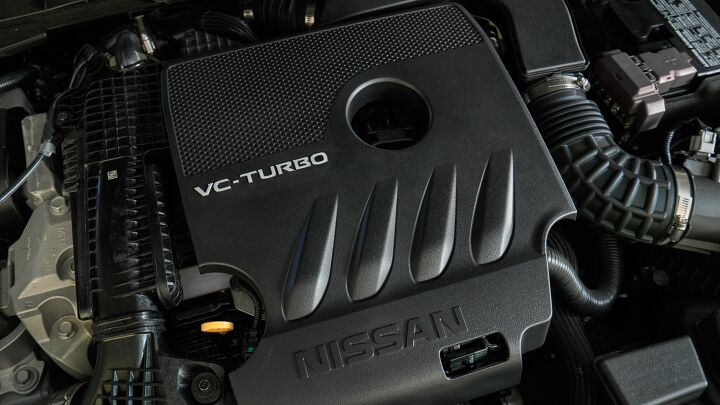The NHTSA is Investigating Nissan's Variable Compression Engine Problems

Nissan hailed its variable compression engines as great for performance and fuel economy, though the real-world benefits of the advanced mills haven’t completely lived up to the hype. They also appear to have issues that could cause a loss of power, knocking sounds, and engine failure in the most extreme cases, leading the National Highway Traffic Safety Administration to open an investigation.
The NHTSA is looking at more than 450,000 Nissan vehicles that use one of its two variable compression engines, including the Altima, Rogue, and Infiniti QX50. Owners have reported all sorts of issues with the 2.0-liter four-cylinder and 1.5-liter three-cylinder engines, but the automaker has not yet issued a recall to address the problems.
Variable compression technology allows the engines to shift their compression ratios to maximize fuel economy or power, depending on the situation. Despite those benefits, Nissan’s engines return only marginally better fuel economy, and the automaker remains the only company using the technology.
Though this is just an investigation at this point, the NHTSA could push for a recall if it determines that there is a defect. The complexity of the engines gives them their notable capabilities, but more complication isn’t always a good thing in mechanical systems. After all, there’s probably a good reason that other automakers haven’t followed Nissan down the variable compression path, and it’s likely because they’re expensive to develop and produce. Their complicated designs could have multiple possible failure points, which is less than desirable for a component that needs to run for tens of thousands of miles.
[Image: Nissan]
Become a TTAC insider. Get the latest news, features, TTAC takes, and everything else that gets to the truth about cars first by subscribing to our newsletter.

Chris grew up in, under, and around cars, but took the long way around to becoming an automotive writer. After a career in technology consulting and a trip through business school, Chris began writing about the automotive industry as a way to reconnect with his passion and get behind the wheel of a new car every week. He focuses on taking complex industry stories and making them digestible by any reader. Just don’t expect him to stay away from high-mileage Porsches.
More by Chris Teague
Latest Car Reviews
Read moreLatest Product Reviews
Read moreRecent Comments
- 2ACL If your driving and/or maintenance regimen wrecked the valves, what other horrors await me? A maintained 2.slow can be decent basic transportation, though many of the models carrying it are old enough to have age-related problems. This is impending heartbreak for anyone not intent on getting their hands dirty.
- Theflyersfan If cutting costs (which usually means cheaper parts and materials) is their plan of attack, all the while dealing with millions of cars recalled and with serious quality issues, I think staying away from Ford is the best thing possible. When you hack and slash away like that, it tends to be a race to the bottom. (See: Nissan and Mitsubishi. )How about, instead, focusing on what is breaking and forcing expensive recalls and emergency service bulletins because it always costs more to fix it after the fact. And then the reputation can be improved and you can charge $100,000 for a pickup without a guilty conscience.
- EBFlex Translation: “We want to lower quality even more”How about stop with the EVs that nobody wants and is a dead end road and invest that into making quality vehicles?
- Jeff Agree but manufacturers in the US have discontinued manuals on most vehicles and eventually discontinue all manuals. The problem is that most vehicles made today have computers controlling most functions in vehicles. HVAC, power steering, power brakes, parking brakes, transmissions, and many other functions that were manual and now electronic. The mechanical functions were easier to repair and more reliable. The Maverick has a lot less technology than many of the newer vehicles at least you can control lights, temperature, and radio without going through a screen but compared to past vehicles I have owned it has more technology than I want or need.I am not looking forward to these recalls as a Maverick owner but I will get them taken care of. I do not like the trend toward mechanical functions that have worked well for decades being controlled through a computer function or CANBUS. It is cheaper for the automakers to buy preassembled components reducing time on the assembly line but it makes it more expensive to work on and the parts are usually more expensive. Hoovie and the Car Wizard have some good videos on the difficulty of working on most modern day vehicles and the increasing expense of replacement parts.
- Funky D I have pretty much my entire music collection on my phone (72 GB) worth, so I always have something to listen to when I don't want to stream SiriusXM.

































Comments
Join the conversation
"...but more complication isn’t always a good thing in mechanical systems."
"...but more complication is never, ever a good thing in mechanical systems, no exceptions."
FIFY
When I first saw a description of these engines I wondered how Nissan had made such a complex design reliable enough for mass production. Guess it turns out they didn’t. I am surprised the tech didn’t provide more efficiency benefits.